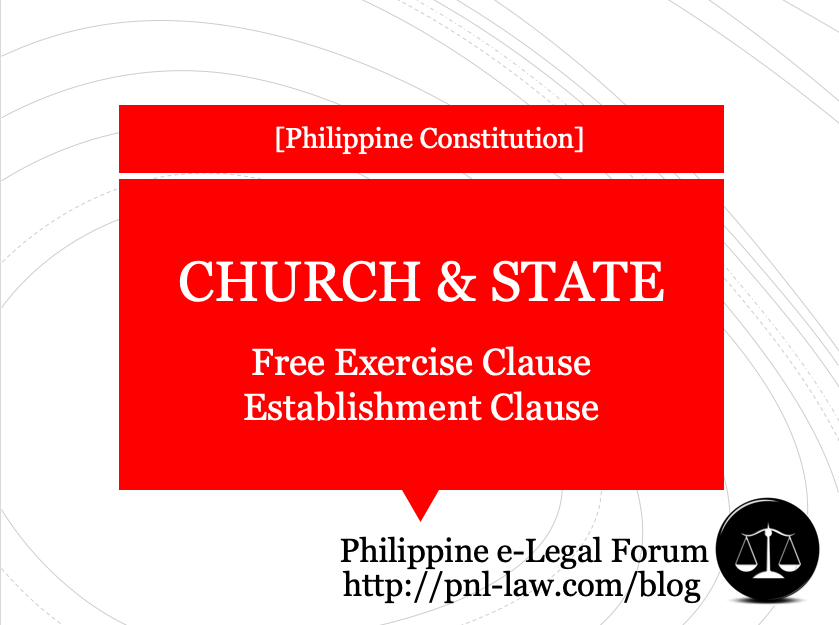In a 2003 case, Supreme Court Justice Reynato Puno extensively discussed the history, nature and jurisprudence on religious clauses in the Philippine Constitution. The defense in that case invoked the religious freedom under Article III, Section 5 of the Constitution, which reads: “No law shall be made respecting an establishment of religion, or prohibiting the free exercise thereof. The free exercise and enjoyment of religious profession and worship, without discrimination or preference, shall forever be allowed. No religious test shall be required for the exercise of civil or political rights.”

RELIGION, DEFINED
“Religion” is derived from the Middle English religioun, from Old French religion, from Latin religio, vaguely referring to a “bond between man and the gods.” This pre-Christian term for the cult and rituals of pagan Rome was first Christianized in the Latin translation of the Bible.
While the U.S. Supreme Court has had to take up the challenge of defining the parameters and contours of “religion” to determine whether a non-theistic belief or act is covered by the religion clauses, the Philippine Supreme Court has not been confronted with the same issue. In Philippine jurisprudence, religion, for purposes of the religion clauses, has thus far been interpreted as theistic. In 1937, the Philippine case of Aglipay v. Ruiz involving the Establishment Clause, defined “religion” as a “profession of faith to an active power that binds and elevates man to his Creator.”
Twenty years later, the Philippine Supreme Court cited the Aglipay definition in American Bible Society v. City of Manila, a case involving the Free Exercise clause. The latter also cited the American case of Davis in defining religion, viz: “(i)t has reference to one’s views of his relations to His Creator and to the obligations they impose of reverence to His being and character and obedience to His Will.” The Beason definition, however, has been expanded in U.S. jurisprudence to include non-theistic beliefs.
FREE EXERCISE CLAUSE
Freedom of choice guarantees the liberty of the religious conscience and prohibits any degree of compulsion or burden, whether direct or indirect, in the practice of one’s religion. The Free Exercise Clause principally guarantees voluntarism, although the Establishment Clause also assures voluntarism by placing the burden of the advancement of religious groups on their intrinsic merits and not on the support of the state.
In interpreting the Free Exercise Clause, the realm of belief poses no difficulty. The difficulty in interpretation sets in when belief is externalized into speech and action.
ESTABLISHMENT CLAUSE
In Philippine jurisdiction, there is substantial agreement on the values sought to be protected by the Establishment Clause, namely, voluntarism and insulation of the political process from interfaith dissension.
The first, voluntarism, has both a personal and a social dimension. As a personal value, it refers to the inviolability of the human conscience which, as discussed above, is also protected by the free exercise clause. From the religious perspective, religion requires voluntarism because compulsory faith lacks religious efficacy. Compelled religion is a contradiction in terms. As a social value, it means that the “growth of a religious sect as a social force must come from the voluntary support of its members because of the belief that both spiritual and secular society will benefit if religions are allowed to compete on their own intrinsic merit without benefit of official patronage.
Such voluntarism cannot be achieved unless the political process is insulated from religion and unless religion is insulated from politics.” Non-establishment thus calls for government neutrality in religious matters to uphold voluntarism and avoid breeding interfaith dissension.
FREE EXERCISE CLAUSE VS. ESTABLISHMENT CLAUSE
In both Philippine and U.S. jurisdiction, it is recognized that there is a tension between the Free Exercise Clause and the Establishment Clause in their application. There is a natural antagonism between a command not to establish religion and a command not to inhibit its practice; this tension between the religion clauses often leaves the courts with a choice between competing values in religion cases.
THE 2003 CASE
In the 2003 case of Estrada vs. Escritor, Justice Puno extensively discussed the religious clauses under the Philippine Constitution. The detailed discussion covers the history, origins, jurirsprudence and provisions of the various religious clauses. The Estrada vs. Escritor case occupies almost half of the Supreme Court Reports Annotated (408 SCRA 1-245).

Pingback: Manuel L. Quezon III: The Daily Dose » Blog Archive » The charge of the Palace brigade
Pingback: The charge of the Palace brigade » Manuel L. Quezon III
If an homeowner in an homeowners association serves during mass in chapel of said subdivision as a laity and is barred from running any position, is this legal?